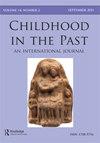我们的每日面包:战后东德为孩子们制作的故事
IF 0.5
Q3 ANTHROPOLOGY
引用次数: 0
摘要
本文重点介绍了三本20世纪50年代东德的描述性绘本,这些绘本解释了面包、牛奶和鱼的生产。这些制作故事不仅通过图文并茂的方式传达知识,而且还强调了五年计划在为德意志民主共和国公民提供粮食方面取得的成就。这种信息和宣传信息的结合有助于鼓励儿童读者对社会主义国家议程的认同。因此,儿童读者作为天真消费者的假定角色与参与政治的社会主义儿童的想法融合在一起。本文章由计算机程序翻译,如有差异,请以英文原文为准。
Our Daily Bread: East German Production Stories for Children in the Postwar Years
ABSTRACT This article focuses on three East German descriptive picturebooks from the 1950s that explain the production of bread, milk, and fish. These production stories not only convey knowledge by means of the juxtaposition of text and images but also emphasize the achievements of the five-year plan with respect to the provision of food for the citizens of the German Democratic Republic. This combination of information and propagandistic messages served to encourage the child readers’ identification with the agenda of the socialist state. Hence, the presumptive role of the child reader as naive consumer merges with the idea of the politically engaged socialist child.
求助全文
通过发布文献求助,成功后即可免费获取论文全文。
去求助
来源期刊

Childhood in the Past
Social Sciences-Anthropology
CiteScore
0.90
自引率
0.00%
发文量
16
期刊介绍:
Childhood in the Past provides a peer-reviewed, interdisciplinary, international forum for the publication of research into all aspects of children and childhood in the past, which transcends conventional intellectual, disciplinary, geographical and chronological boundaries. The editor welcomes offers of papers from any field of study which can further knowledge and understanding of the nature and experience of childhood in the past.
 求助内容:
求助内容: 应助结果提醒方式:
应助结果提醒方式:


